
Slogging through the dead of winter with thick-bundled bodies and clouded breath, gingerly stepping from ice-free patch to ice-free patch, cursing the many cold and sunless days till March, we could use a little bright spot in all this gray. Perhaps a snowflake fluttering down just so, perfectly framing the universe for a hushed moment, or a cup of steaming hot chocolate cradled tenderly in grateful fingers, or even a rosy-cheeked young imp flinging a playful snowball across our grumbling brows.
Or—how about this—a selection of poems about winter, snow, and ice, to bring us outside ourselves for a moment, show us the frozen world through someone else's eyes? So take off your coat, put your feet up by our virtual fire, and warm your heart with some winged words about the wintertime.
Charles
Baudelaire ("The Cracked Bell")
Yves
Bonnefoy ("The Only Rose")
John
Hollander ("Effet de Neige")
Victor
Hugo ("'Be off!' say Winter's snows..." and "Archangel Winter")
Gail
Mazur ("Ice" and "The Idea of Florida During a Midwinter Thaw")
Robert
Pack ("Snow Rise," "Storm," and "Midwinter Thaw")
Paul
Verlaine ("Covering the land...")
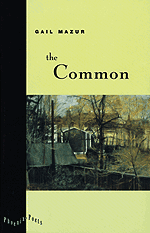
"Ice"
by Gail
Mazur
from The
Common
Copyright 1995 by The University of Chicago
In the warming house, children lace their skates,
bending, choked,
over their thick jackets.
A Franklin stove keeps the place so cozy
it's hard to imagine why
anyone would leave,
clumping across the frozen beach to the river.
December's always the
same at Ware's Cove,
the first sheer ice, black, then white
and deep until the city sends
trucks of men
with wooden barriers to put up the boys'
hockey rink. An hour of
skating after school,
of trying wobbly figure-8's, an hour
of distances moved backwards
without falling,
then—twilight, the warming house steamy
with girls pulling on boots,
their chafed legs
aching. Outside, the hockey players keep
playing, slamming the round
black puck
until it's dark, until supper. At night,
a shy girl comes to the
cove with her father.
Although there isn't music, they glide
arm in arm onto the blurred
surface together,
braced like dancers. She thinks she'll never
be so happy, for who
else will find her graceful,
find her perfect, skate with her
in circles outside the emptied rink
forever?
"The Idea of Florida During a Winter
Thaw"
by Gail Mazur
from The
Common
Copyright 1995 by The University of Chicago
Late February, and the air's so balmy
snowdrops and crocuses might
be fooled
into early blooming. Then, the inevitable blizzard
will
come, blighting our harbingers of spring,
and the numbed yards will go
back undercover.
In Florida, it's strawberry season—
shortcake,
waffles, berries and cream
will be penciled on the coffeeshop
menus.
In Winter Haven, the ballplayers are stretching
and preening,
dancing on the basepaths,
giddy as good kids playing hookey.
Now,
for a few weeks, statistics won't seem
to matter, for the
flushed boys are muscular
and chaste, lovely as lakes to the retired
men
watching calisthenics from the grandstands.
Escapees from the
cold work of living,
the old men burnish stories of Yaz and the Babe
and the Splendid
Splinter. For a few dreamy dollars,
they sit with their wives all day
in the sun,
on their own little seat cushions, wearing soft
caps
with visors. Their brave recreational vehicles
grow hot in the
parking lot, though they're
shaded by live oaks and bottlebrush
trees
whose soft bristles graze the top-racks.
At four, the spectators leave in pairs, off
to restaurants for Early
Bird Specials.
A salamander scuttles across the quiet
visitors'
dugout. The osprey whose nest is atop
the foul pole relaxes. She's
raged all afternoon
at balls hit again and again toward her
offspring.
Although December's frost killed the winter crop,
there's
a pulpy orange-y smell from juice factories....
Down the road, at Cypress Gardens, a woman
trainer flips young
alligators over on their backs,
demonstrating their talent for
comedy—stroke
their bellies, they're out cold,
instantaneously
snoozing. A schoolgirl on vacation gapes,
wonders if
she'd ever be brave enough
to try that, to hold a terrifying
beast
and turn it into something cartoon-funny.
She stretches a hand toward the toothy sleeper
then takes a step
back, to be safe as she reaches.
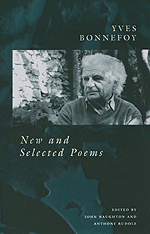
"The Only Rose"
by
Yves Bonnefoy
Translated by John
Naughton
from New
and Selected Poems
Copyright 1995 by The University of
Chicago
I
It's snowing, it's returning to a town
Where, as I discover as I go
through
Empty streets I come upon by chance,
I might have happily
lived some other childhood.
Beneath the snowflakes I notice
façades
More beautiful than anything in this world.
Among us, only
Alberti, then Sangallo,
At San Biagio, in the most intense room
That
desire has ever built, have approached
This perfection, this
absence.
And so I gaze avidly
At these masses the snow hides from me.
I
seek, above all, in the wandering
Whiteness, those pediments that
rise
To a higher level of appearance.
They tear apart the mist, it
is as though,
With a hand freed from weight,
The mortal architect
had brought to life,
In a single floral stroke,
The form sought for
centuries by
The pain of being born into matter.
II
And up there I cannot tell if it is still
Life, or only joy, that
stands out
Against this sky no longer of our world.
Oh you
builders,
Not so much of place as of renewed hope,
What is there in
the depths of these walls
That open before me? What I see
Along the
walls are only empty niches,
Partly stone, partly the absence of
stone,
From which, thanks to symmetry,
The weight of being born into
exile is lifted.
But snow has gathered there, has piled up,
I draw
near to one of them, the lowest,
I bring down a bit of its light
And
all at once it is the meadow I walked in at ten,
The bees are
buzzing,
What I have in my hands, these flowers, these shadows,
Is
it almost honey, is it snow?
III
And then I go on until I am beneath an archway,
The snowflakes are
swirling, blotting out
The line between the outside and this
room
Where lamps are lit: these, too,
A kind of snow, which
hesitates
Between the high and the low, in this night.
It is as
though I were at a second threshold.
And beyond, the same sound of bees
In the sound of the snow. What
the countless
Summer bees were saying
Seems reflected in the
infinite of the lamps.
And I would like
To run, as in the time of the bee, seeking
With
my foot the supple ball, for perhaps
I am sleeping, and dreaming, and
wandering along
The paths of childhood.
IV
But what I am looking at is hardened snow,
The flakes which have
stolen onto the flagstones
And piled up at the base of the
columns
Left and right, and far ahead in the dusk.
Absurdly, my eyes
can only see the arc
That this mud draws on the stone.
My only
thought is for what has
No name, no meaning. Oh my friends,
Alberti,
Brunelleschi, Sangallo,
Palladio who beckons from the other shore,
I
do not betray you, I still go forward,
The purest form is always the
one
Pierced by the mist that fades away,
Trampled snow is the only
rose.
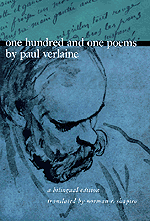
"Covering the
land..."
by Paul Verlaine
Translated by Norman R. Shapiro
from One
Hundred and One Poems by Paul Verlaine: A Bilingual
Edition
Copyright 1999 by The University of Chicago
Covering the land—
Dismal, endless plain—
Blurring the
terrain,
Snow haze gleams like sand.
Bronze the sky, with no
Glimmering of light:
Is the moon to
grow
Dim, and die tonight?
In the woods, close by,
Billows the fog, cloaks
Gray the
cloud-like oaks
Floating on the sky.
Bronze the sky, with no
Glimmering of light:
Is the moon to
grow
Dim, and die tonight?
Scrawny wolves, and you,
Wheezing ravens, when
Winds blow sharp,
what then?
What? What can you do?
Covering the land—
Dismal, endless plain—
Blurring the
terrain,
Snow haze gleams like sand.
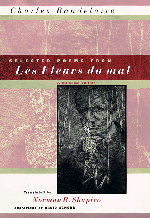
"The Cracked
Bell"
by Charles Baudelaire
Translated by Norman R. Shapiro
from Selected
Poems from Les Fleurs du mal: A Bilingual Edition
Copyright
1998 and 1999 by The University of Chicago
How bittersweet it is, on winter's night,
To listen, by the
sputtering, smoking fire,
As distant memories, through the fog-dimmed
light,
Rise, to the muffled chime of churchbell choir.
Lucky the bell—still full and deep of throat,
Clear-voiced despite
its years, strong, eloquent—
That rings, with faithful tongue, its
pious note
Like an old soldier, wakeful, in his tent!
My soul lies cracked; and when, in its despair,
Pealing, it tries to
fill the cold night air
With its lament, it often sounds, instead,
Like some poor wounded wretch—long left for dead
Beneath a pile of
corpses, lying massed
By bloody pool—rattling, gasping his last.
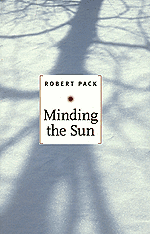
"Snow Rise"
by Robert
Pack
from Minding
the Sun
Copyright 1996 by Robert Pack; used with
permission
Dreaming time has reversed, I watch drowned snow
Appear to lift up
from the lake;
Reshaping magnified, each risen flake
Looms in the
air, deliberate and slow,
Allowing me to let your picture form and
wake
Astonished that you have returned to go
To watch me watch
drowned snow lift from the lake.
Dreaming time has reversed—and
you,
Your red cheeks radiant against the wind,
Are gliding toward me
on the ice into
A frame of glided twilight—I
Again awaken from your
being gone to find
Your gloved hands covering your lips'
good-bye
So you can watch me watch uplifted snow
As if your
absence now concluded long ago.
"Storm"
by Robert Pack
from Minding
the Sun
Copyright 1996 by Robert Pack; used with
permission
Cascading snowflakes settle in the pines,
Sculpting each tree to fit
your ghostly form
The surge of swirling wind defines
As if your
human shape were what the storm
Sought to contrive, intending to
express
Its consciousness of my white consciousness,
Sculpting each
tree to fit your ghostly form.
Cascading snowflakes settle in the
pines,
Swaying in unison beneath the snow,
Calling me to you with
wild gesturings
Homeward into the howling woods, although
Thinking
of your abiding spirit brings
Only a whiter absence to my mind,
Only
whirled snow heaped up by whirled snow,
Only a fox whose den I cannot
find.
"Midwinter Thaw"
by Robert
Pack
from Minding
the Sun
Copyright 1996 by Robert Pack; used with
permission
Stunned in their voiceless way to be alive
This drizzling three-day
January thaw,
Green lilac buds appear that won't survive
When Arctic
winds crack down from Canada
And half-starved foxes shake and paw
A
rabbit carcass in its stiffened fur.
Green lilac buds appear that won't
survive
This third day of our January thaw,
This gap in time, this
season not their own,
Merely a mockery of spring
With sun's warmth
wasted on a stone,
And still my mind goes groping in the mud to
bring
Some stubborn sprouts up through the stubble hay,
To follow in
the path of their brief blossoming
In search of brighter green to come.
No way!
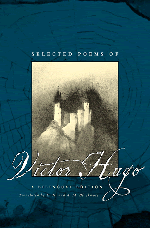
"'Be off!' say Winter's
snows..."
by Victor Hugo
Translated by E. H. and A. M. Blackmore
from Selected
Poems of Victor Hugo: A Bilingual Edition
Copyright 2001 by The
University of Chicago
"Be off!" say Winter's snows;
"Now it's my turn to sing!"
So,
startled, quivering,
Not daring to oppose
(Our fortitude grows dim in
The face of a Quos ego),
Away,
my songs, must we go
Before those virile women!
Rain. We are forced to fly,
Everywhere, utterly.
End of the
comedy.
Come, swallows, it's good-bye.
Wind, sleet. The branches sway,
Writhing their stunted limbs,
And
off the white smoke swims
Across the heavens' gray.
A pallid yellow lingers
Over the chilly dale.
My keyhole blows a
gale
Onto my frozen fingers.
"Archangel Winter" (from "Beyond the Earth
III")
by Victor Hugo
Translated
by E. H. and A. M. Blackmore
from Selected
Poems of Victor Hugo: A Bilingual Edition
Copyright 2001 by The
University of Chicago
In the dread circle hemmed by glaciers,
Pallid waste where no
radiant fathomers,
Columbuses or Gamas, ever pass,
In realms of
dingy gloom and deep crevasse
Seized from creation by
nonentity,
Beyond ice floe and berg and ice-bound sea,
Deep in the
fog that quenches every ray,
In stone waves and rock waters, far from
day,
Amid the gloom, there, on the pole, stands black
Archangel
Winter, darkness on his back
And trumpet at his lips; nor does he
cast
One flash of eye, or blow one clarion-blast;
He never even
dreams, being sheer snow;
The winged winds, captives of that age-old
foe
Silence, are in his hand—birds in a snare;
His sightless eyes
horribly watch the air;
Hoarfrost is in his bones and on his
head,
And he is swathed in ever-petrified dread;
He terrifies the
Vast, he seems so wild;
He is harsh, dismal, ice—that is,
exiled;
The earth beneath his feet, in its dark cape,
Is dumb; he is
the mute white stony shape
Set on that tomb in the eternal
night;
Never does any motion, sound, or light
Brush the lone giant
in that somber pall.
But when, on the timepieces that we call
Stars,
the last day, endless and centerless,
Will sound, then the Lord's face
will luminesce
And melt the spirit; his mouth will distend
Suddenly,
in a savage, dreadful bend,
And the worlds—skiffs rudderless, rolling
on—
Will hear the storm-blast of his clarion.
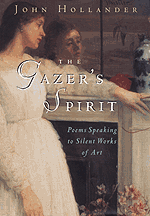
"Effet de Neige"
(after the painting La Route de la ferme Saint-Siméon by Claude
Monet)
by John Hollander
for
Andrew Forge
from The
Gazer's Spirit: Poems Speaking to Silent Works of Art
Copyright
1995 by The University of Chicago
"Effet de Neige" copyright 1985 by
John Hollander; used with permission
SAYING:
Figures of light and dark, these two are walking
The winter road
from the St. Simeon farm
Toward something that the world is pointing
toward
At the white place of the road's vanishing
Between the vertex
that the far-lit gray
Of tree-dividing sky finally comes down to
And
the wide arrowhead the road itself
Comes up with as a means to its own
end.
Père and Mère Chose could be in conversation
Or else, like us,
sunk into some long gaze
Unreadable from behind—they are well
down
The road, but not far enough ahead
For any part of them we can
make out
To have been claimed by what we see of what
They move
against, or through, or by, or toward.
Toward . . . that seems to be
the whispered question
That images of roads, whether composed
By the
design of our own silent eyes
Or by the loud hand of painting, always
puts.
Where does this all end? What is the vanishing
Point, after
all, when finally one reaches
The ordinary, wide scene which
begins
To reach out into its own vanishing
From there. Toward . .
.
SEEING:
: : : : :
SAYING:
Yes. You'd want that said, (if you
Want anything said at all, which
I still doubt)
—The place the road ends, that patch of white
paint
marked with a dark stroke from the left, encroached
Upon from
the right by far trees, that white place
Sits at the limit of a kind of
world
That only you and I can know. Les deux
Choces, Mère and Père,
undreaming even of fields
Of meaning like these—the world created
by
That square—Oh, 56 x 56
Centimeters—that the height of the
canvas
Cuts out of its width (81). Unfair
To mark that square,
perhaps: were Mère and Père
Chose to walk out of it, they'd have to
pass
Out of the picture of life, as it were, out
Through the back of
the picture at the patch of white
At the end of the road. Even if they
are staring
Down the long course of the gray slush of things
How can
they get the point of how a world
Like theirs ends? From what distant
point of vision
Would their world not remain comfortably
Coextensive
with everything? How could they know?
What can we know of whatever
picture-plane
Against which we have been projected? What . . .
SEEING:
: : : : :
SAYING:
Oh, I know. The snow. The effective snow
Of observation lying on the
ground
Given by nature will soak into it.
Wheel tracks entrench
themselves in snow, yet painted
Traces of those deep cuts lie thickly
upon
The high whites spread over the buried earth.
Shadows keep
piling up as surfaces
Are muffled into silence that refuses
To pick
up even the quickening of wind
In dense bare branches, or the
ubiquitous
Snaps of ice cracking in the hidden air.
Silence. Your
way of being. Your way of seeing
Still has to be intoned, as in a
lonely
Place of absorbing snow, itself to be
Seen. What you know is
only manifest
When I am heard, and what I say is solely
A matter of
getting all that right . . .
SEEING:
: : : : :
SAYING:
I know,
I've drifted somewhat from the distant heart
Of the
matter of snow here. Both of us have grasped
That patch of white at the
very end of the road
As it sits there like an eventual
Sphinx of
questioning substance, or a sort
Of Boyg of Normandy . . .
SEEING:
: : : : :
SAYING:
Yes. The obvious
Standing in the way of the truth. A white
Close
at the end of distance the two Chose
People might see to be the
opening
Out of the road into a way across
Wide, whited fields, a way
unframed at last
By trees—or might see as the masonry
Of a far barn,
just where the road curves sharply
Right, and appears from here to be
overcome
By what it seems to have moved toward. In any
Event, the
end of the painted road ends up
In white, in paint too
representative
Of too much truth to do much more than lie
High on
this surface, guarding the edge of Père
And Mère Chose's square of
world, even as they
—Now that you notice it—have just moved past
The
edge of that other square cut from the right
Side of the painting, the
world of that wise, white,
Silent patch of ultimate paint. You
are
Grateful, I know, for just such compensations,
That neither the
motionless farm couple trudging
Toward the still dab of white that
oscillates
From point to point of meaning—open? closed?—
Nor,
indeed, the bit of paint itself can know of.
SEEING:
: : : : :
SAYING:
Mère and Père Chose are walking away from the
Two of us, Docteur and
Madame Machin, who stand
Away from their profundity of surface.
SEEING:
: : : : :
SAYING:
The truth, blocking the path of the obvious.
See also:
- Jeannette Mirsky, To the Arctic! The Story of Northern Exploration from Earliest Times
- E. C. Pielou, After the Ice Age: The Return of Life to Glaciated North America
- E. C. Pielou, Fresh Water (includes a chapter about what happens "When Water Freezes")
- E. C. Pielou, A Naturalist's Guide to the Arctic
- Geoffrey K. Pullum, The Great Eskimo Vocabulary Hoax and Other Irreverent Essays on the Study of Language
- Our online catalog of poetry books
- Other excerpts and online essays from University of Chicago Press books
